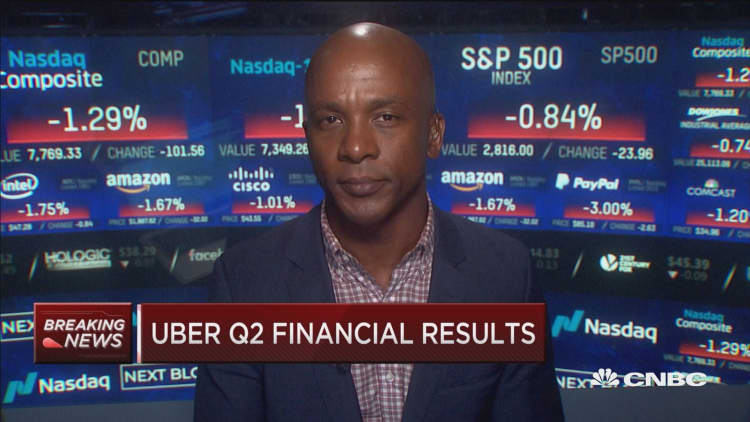Less than two months after New York limited the number of cars Uber could have on the roads, the ride-hailing company said it is putting money and resources into a potential fix to the city's traffic congestion problem.
Uber said on Wednesday that it will invest $10 million over the next three years on a new "campaign for sustainable mobility." The centerpiece of that effort will be lobbying in favor of proposals for congestion pricing, which allows the city to charge vehicles a fee to enter high-density areas. The fees collected would go toward improvements in public transit.
Uber will also use its initial investment to collect and share data on street speeds and will donate funds to an organization that lobbies for friendlier bike policies in cities around the U.S.
The company has unsuccessfully pushed for congestion pricing in the past. The renewed effort follows New York City's controversial vehicle cap on ride-hailing companies last month. Both Uber and rival Lyft were opposed to the measure, with Uber saying it would lead to longer wait times and higher prices for riders.
Congestion pricing is already in place in London and Singapore. Andrew Salzberg, Uber's head of transportation policy, told CNBC that the company views congestion pricing as the real answer to solving traffic problems. He said Uber will help fund TV ads and third-party ads at the state level and is putting its "energy and money behind sustainable transport policies."
A report from FixNYC, an advisory panel appointed by Gov. Andrew Cuomo to come up with transit solutions, said traffic congestion is expected to cost the New York metro area $100 billion over the next five years. The report also estimated that the proposed congestion pricing plans could generate up to $1.5 billion annually to fund public transit in New York.
It's a familiar topic. Congestion pricing policies have been proposed three times in New York City since the 1970s and have repeatedly faced backlash, according to The New York Times.
The company said it hasn't yet figured out if congestion pricing fees would be charged to its drivers or passengers.
In recent months, Uber has been expanding its U.S. offerings beyond ride-hailing, to include e-bikes and e-scooters. CEO Dara Khosrowshahi said back in June he wants Uber to be the "A-to-B platform for transportation."
Uber is working with cities to build out infrastructure to support its Jump e-bikes. That effort is starting in Sacramento, California, where Uber is building charging stations for e-bikes and plans to have 300 chargers by the end of the year.



